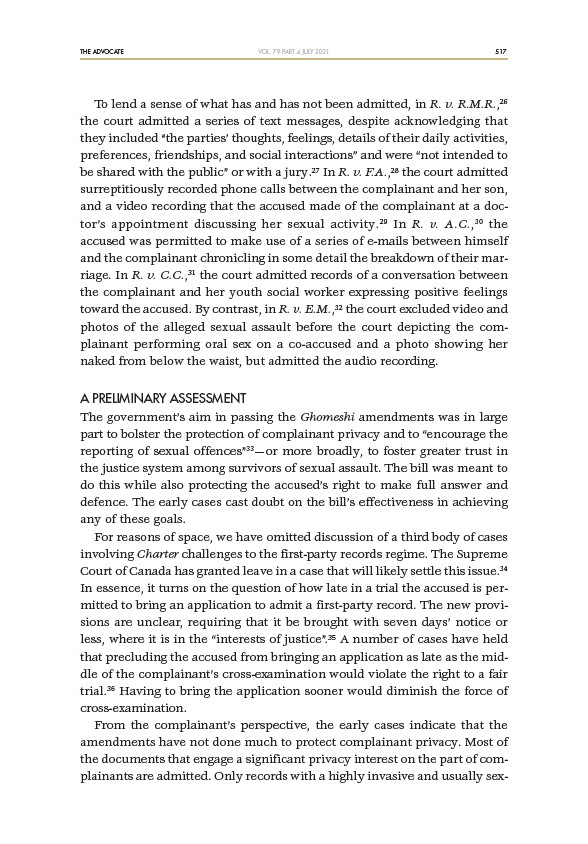
THE ADVOCATE 517
VOL. 79 PART 4 JULY 2021
To lend a sense of what has and has not been admitted, in R. v. R.M.R.,26
the court admitted a series of text messages, despite acknowledging that
they included “the parties’ thoughts, feelings, details of their daily activities,
preferences, friendships, and social interactions” and were “not intended to
be shared with the public” or with a jury.27 In R. v. F.A.,28 the court admitted
surreptitiously recorded phone calls between the complainant and her son,
and a video recording that the accused made of the complainant at a doctor’s
appointment discussing her sexual activity.29 In R. v. A.C.,30 the
accused was permitted to make use of a series of e-mails between himself
and the complainant chronicling in some detail the breakdown of their marriage.
In R. v. C.C.,31 the court admitted records of a conversation between
the complainant and her youth social worker expressing positive feelings
toward the accused. By contrast, in R. v. E.M.,32 the court excluded video and
photos of the alleged sexual assault before the court depicting the complainant
performing oral sex on a co-accused and a photo showing her
naked from below the waist, but admitted the audio recording.
A PRELIMINARY ASSESSMENT
The government’s aim in passing the Ghomeshi amendments was in large
part to bolster the protection of complainant privacy and to “encourage the
reporting of sexual offences”33—or more broadly, to foster greater trust in
the justice system among survivors of sexual assault. The bill was meant to
do this while also protecting the accused’s right to make full answer and
defence. The early cases cast doubt on the bill’s effectiveness in achieving
any of these goals.
For reasons of space, we have omitted discussion of a third body of cases
involving Charter challenges to the first-party records regime. The Supreme
Court of Canada has granted leave in a case that will likely settle this issue.34
In essence, it turns on the question of how late in a trial the accused is permitted
to bring an application to admit a first-party record. The new provisions
are unclear, requiring that it be brought with seven days’ notice or
less, where it is in the “interests of justice”.35 A number of cases have held
that precluding the accused from bringing an application as late as the middle
of the complainant’s cross-examination would violate the right to a fair
trial.36 Having to bring the application sooner would diminish the force of
cross-examination.
From the complainant’s perspective, the early cases indicate that the
amendments have not done much to protect complainant privacy. Most of
the documents that engage a significant privacy interest on the part of complainants
are admitted. Only records with a highly invasive and usually sex-